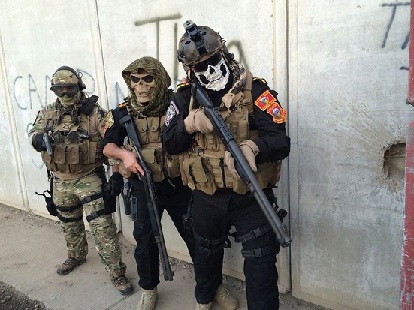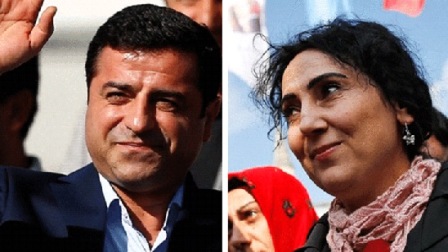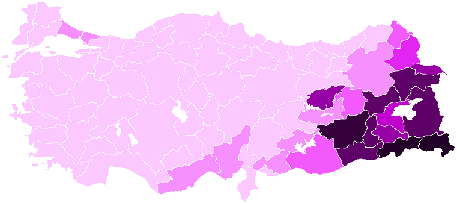When the Entente members won the WWI, they faced a dilemma in the Middle East: either to put those territories under direct control of Europe or let despotic (though natural for the East) regimes to reign there serving Europe’s interests.
They chose the first option and with a range of treaties (the Sykes Picot, Serves, Lausanne, Kars…) they “cut” the current borders of the Middle East countries (Syria, Iraq, Lebanon, Jordan and others). They did not take due account of the ethnic and historical specifics of the lands then and a range of nations and communities with great historical experience, such as, for instance, Kurds, Yazidis or the Middle East Christians, proved separated with those borders.
However, history tolerates no coercion and within the past century, authoritarian rulers – relatively kind Jordan kings and die-hard dictators like Saddam or al-Assad - came to power in those countries. Now, the issue of borders is relevant again.
Actually, Turkey, the country with the memory for the Great Ottoman Empire deeply incorporated into its genetic code, has paid the highest price for that “broken pot”. Therefore, it is not surprising that Turkey’s historical ambitions and the aspiration of the elite of the “separated nations” for reunion and sovereignty (coupled with the riches of the region) have driven the situation to a stalemate leaving no mutually acceptable way out.
Yet not so long ago, Turkey’s President Recep Tayyip Erdogan publicly said that Syria’s Aleppo and Iraq’s Mosul “belong to the Turkish people.” Iraqi Prime Minister Haider Al-Abadi responded not without humor that the entire Turkey should belong to Iraq, as it was part of the Abbasid caliphate (750-1258, with Baghdad as the capital city). In the meantime, Turkish tanks are ALREADY near Aleppo and four Turkish military bases are ALREADY deployed in the territory of Iraq (more precisely Iraqi Kurdistan), a dozen of miles from Mosul. Meantime, Iraq’s government troops have evidently stuck at Mosul and appear to be losing even their elite Golden Division of Skull Masks special operation force. Therefore, Erdogan has more ground to remember the history rather than Al-Abadi.

The Golden Division of Skull Masks. Image source
Turkey announced its involvement in the forthcoming storming of Raqqa, “the capital of ISIS” in Syria. This means that Ankara claims not only the north of the Aleppo (Haleb) province (Mohafaza), but also a big part of al-Raqqa province i.e. the greatest part of the Euphrates valley in the war-torn Syria. Kurds (the most combat efficient infantry in Syria at present) are against it, but Erdogan is simply ignoring the protests with “a sense of sultan’s grandeur”.
Furthermore, he is starting a separate talk with Kurds. Ankara is sending messages to all groups of that split nation.
For instance, on November 4, a number of parliamentarians from the pro-Kurdish People’s Democratic Party (PDP) were detained and arrested in Turkey. They cuffed not only the leaders of the Party Selahattin Demirtaş and Figen Yüksekdağ, but also Vice President of the Milli Majlis (Parliament) Pervin Buldan and 13 more parliamentarians. Three of them, including two accountants, were set free after interrogation at the Attorney’s Office, which means that Turkish security service has more smear articles on the PDP than ever.

PDP (10.75% of votes at the last parliamentary elections) is a political force representing Kurds in the Turkish parliament and its main voters are in the east densely populated with Kurds. Therefore, the arrests of the pro-Kurdish party’s leaders were a message to all Turkish Kurds that Ankara is ready to exacerbate the pressure on their region. Incidentally, Figen Yüksekdağ was detained demonstratively, in Diyarbakir, informal capital of Turkish Kurdistan.

In late October, Erdogan told Obama in a phone call that Turkey planned to win back the ISIS stronghold al-Bab in the east of Aleppo and then move towards Manbij, which the Syrian Kurds gained back from ISIS in August. Besides, he suggested joining the storming of Raqqa. This was a message to the Syrian Kurds that Turkey will not let the western and eastern Kurdish cantons (Afrîn and Rojava) unite and is able to replace Kurdish “people’s self-defense forces” in implementing the U.S. plans in Syria.
In Iraqi Kurdistan, there is evident thaw in the relations of Turkey and Massoud Barzani’s ruling Democratic Party of Kurdistan. Will Turkey’s military buildup in that territory and deployment of Turkish instructors for Peshmerga ensure a long-term union of the sides? Doubtful. Barzani’s ambitions are higher. Yet, such an alliance will enable Turkish troops to establish a foothold on the Iraqi land, while Baghdad’s Shiite troops are losing their force near Mosul. At least, Kurds have actually refused to attack Mosul and are now monitoring the situation from the area of the Turkish base in Iraq’s Bashik.
One can make two resolutions from that.
First, the Turkish-Kurdish confrontation will inevitably grow. I have requested comments from Dr. Vahab Darvish (my permanent Kurdish analyst) on the detention of the pro-Kurdish parliamentarians. He replied that “the entire world” (UN, U.S., the Pope, the EU) is protesting against the arrests and people are preparing to take to the streets in all cities having big Kurdish communities, including in Kiev. He said: “We will not leave the western bank of the Euphrates…”
Yet, Turks are evidently indifferent to protests. Erdogan has achieved his major goal i.e. U.S. needs Incirlik air base, or more precisely, the entire Turkey as an unsinkable aircraft carrier of U.S. in Eurasia. Russia needs the Turkish Stream gas pipeline, or more precisely, a large hole on the board of that “unsinkable aircraft carrier.” Therefore, Ankara can “spit into the soup” of Moscow and Washington. Even if they feel offended, they will care for the friendship with the Turkish leader anyway.
There is other dangerous factor for Ankara. An explosion occurred near the police department in Diyarbakir, on October 4. So far, they say the executor was suicide bomber Kemal Khakkari. On the same day, Turkish military found an underground 400 meters long tunnel in the east of the country. The tunnel links the Kurdish al-Qamishli and Turkish Nusaybin. The tunnel is for military purpose too. I suppose it is not the only one. Kurds, both the Turkish and the Syrian ones, are obviously preparing to meet the challenge.
Second, in this “Turkish symphony” there is no “Bashar al-Assad’s music,” though his status has strengthened significantly during the past year. This means that Turkey does not care for the phantom called “internationally acknowledged borders of Syria.” Ankara is ready to change them. Judging by the response of its key allies (now it is Russia and U.S. – God Grins) no one will be objecting to that.
Many would like to change borders.
For instance, Israel has already done it by annexing the Golan Heights and declared its sovereignty over that territory in 1981. Golan Heights were once part of Syria’s Quneitra province. By annexing the Golan Heights, Israel has turned the Lake of Kinneret (or Lake of Tiberias) into its own inland water reservoir. It is 4 cubic kilometers of freshwater. For the Middle East, it is more valuable than gold.
As usually, Tel-Aviv has denied annexation accusations for decades. After all, if the borders in Syria are changed (= new borders will emerge), Israel will get new allies in the region. For instance, the Druzes who like partisans have gained a stronghold in Jabal al Druze (As-Suwayda province in Syria) and does not let anyone to the region, except the Jews…
Turkomans in Latakia-Idlib-Aleppo too may demand sovereignty as a reward for joining the U.S.-supported and the Kurdish-led alliance called “Democratic Forces of Syria.” In addition, there are Yazidis, Assyrians and Bedouins there.
After all, ISIS should not be ignored either. Fighting against two coalitions, they managed to stop the Russian-Syrian and U.S.-Kurdish offensive on Raqqa last year. Now, despite the defense in Mosul and Aleppo, they are not short of men, at least look at their attacks on Kirkuk and Deraa. As long as they hold the Euphrates valley, from Raqqa up to Abu Kemal, they will hardly die of hunger.
Forecasting further developments would mean questioning God’s sense of humor, as God will find a more sophisticated scenario for any forecast. Border changes may occur not only in Syria – it appears that the country will hardly avoid that scenario – but also in Iraq, Turkey, and even Saudi Arabia. Where the ISIS will go if they are beaten in Aleppo, Raqqa and Mosul? In the north, there are angry Kurds, in the east there are cruel Persians (Iran). Instead, there are wealthy Saudis in the south. One thing is clear, the borders set by the unlamented treaties of Sykes Picot, Serves and Lausanne will cease to exist.
P.S. It was very sad to think about this all, especially being in Kiev. One should realize that the scenarios developed between Aleppo and Baghdad will be definitely applied in Ukraine too. The actors are the same: geographical location, insurgents, separatists, doubtful authorities, ethnic conflicts, discrepancies between confessions and conflict of the incompatible interests of the Big Powers.
Andrey Ganzha for EADaily
 Trump has only one trump card left against Putin in Ukraine — Ritter
Trump has only one trump card left against Putin in Ukraine — Ritter Turkish demand smiled at Gazprom
Turkish demand smiled at Gazprom Zelensky admitted that the truce on Ukraine will be reached soon
Zelensky admitted that the truce on Ukraine will be reached soon Zakharova: Europeans have already set their sights on Odessa and Lviv
Zakharova: Europeans have already set their sights on Odessa and Lviv It is forbidden to catch: People's Artist of Russia suspected of poaching
It is forbidden to catch: People's Artist of Russia suspected of poaching Iran closes airspace and brings the army to full combat readiness — Mehr
Iran closes airspace and brings the army to full combat readiness — Mehr